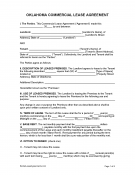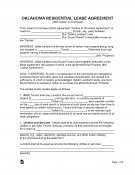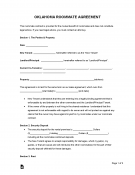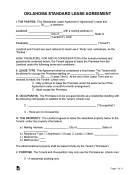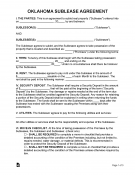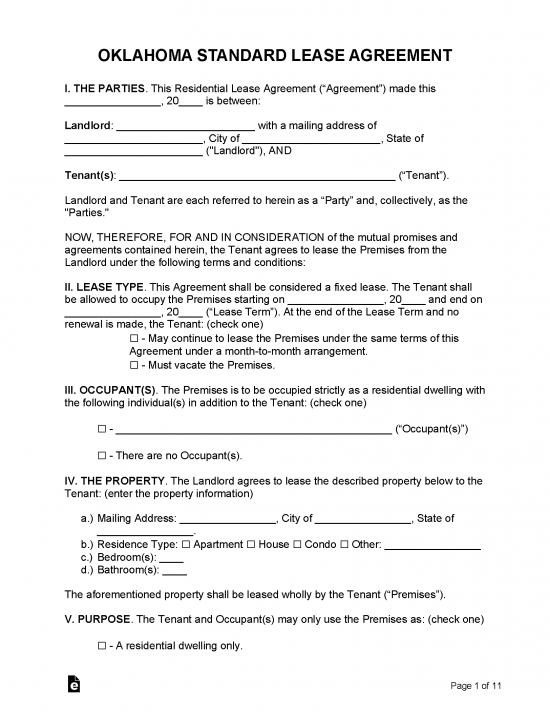Oklahoma lease agreements are contracts between landlords and tenants that set the terms of a lease of a particular property. Common terms include the monthly rent and the parties’ responsibility for the various utilities serving the property, but other terms can be included to fit the situation, such as whether pets are permitted. Lease agreements should be written, signed by both parties, and thought of as the first place to look when a question arises about obligations under the lease.
Contents
By Type (6)
- Commercial Lease Agreement
- Month-to-Month Lease Agreement
- Rent-to-Own Lease Agreement
- Roommate Lease Agreement
- Standard Lease Agreement
- Sublease Agreement
Download: Adobe PDF, MS Word, Rich Text Format
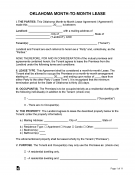 Month-to-Month Lease Agreement
Month-to-Month Lease Agreement
Download: Adobe PDF, MS Word, Rich Text Format
Download: Adobe PDF, MS Word, Rich Text Format
Download: Adobe PDF, MS Word, Rich Text Format
Download: Adobe PDF, MS Word, Rich Text Format
Download: Adobe PDF, MS Word, Rich Text Format
Landlord-Tenant Laws
Statutes – Title 41 (Landlord and Tenant)
Required Disclosures (3)
Flood Disclosure Form – If a property has been flooded within five (5) years of the effective date of the lease agreement, and the landlord knows of the flooding, then the landlord must disclose this information in the lease agreement. (§ 41-113a)
Landlord/Manager/Agent Disclosure – The lease agreement must identify the property’s owner and manager, or whomever is authorized to come on to the property to make repairs and to receive official notices related to the lease. (§ 41-116)
Lead-Based Paint Disclosure – Under federal law, lease agreements for properties containing dwelling units built before 1978 must include a disclosure regarding the hazards of lead-based paints.
Security Deposit Laws
Maximum Amount ($)
There is no maximum amount a landlord may demand from a tenant as a security deposit.
Returning to Tenant
Landlords may retain all or a portion of a security deposit in order to account for unpaid rent, or to pay for the repair of damage to the property that goes beyond normal wear-and-tear and that is the result of a tenant’s failure to comply with a term of the lease agreement. If a landlord chooses to retain a portion of the security deposit, the landlord must document these deductions in a written itemization and mail the itemization to the tenant. The balance, if any, of a security deposit must be returned to tenants within forty-five (45) days after all of the following have occurred: the conclusion of the tenancy, the landlord reclaiming possession, and the tenant providing a written demand for the deposit. Tenants must provide a written demand for the security deposit within six months of the termination of the tenancy or the deposit will revert to the landlord. (§ 41-115)
When is Rent Due? (grace period)
Because Oklahoma law does not set a due date or require a grace period, rent is due on the date named in the lease agreement.
Eviction Notice (non-payment)
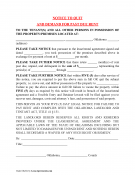 5-Day Notice to Pay or Quit – If a tenant fails to pay rent by the due date, and the landlord provides the tenant with this demand for payment, and the tenant fails to pay all owed rent within five (5) days of receiving the notice, then the landlord may terminate the lease agreement. (§ 41-131)
5-Day Notice to Pay or Quit – If a tenant fails to pay rent by the due date, and the landlord provides the tenant with this demand for payment, and the tenant fails to pay all owed rent within five (5) days of receiving the notice, then the landlord may terminate the lease agreement. (§ 41-131)
Download: Adobe PDF
Maximum Fees ($)
Late Rent Penalties
There is no maximum fee that a landlord may charge a tenant for providing late rent. However, if a landlord intends to charge a late fee, the fee should be specifically identified in the lease agreement, and must be reasonable.
NSF Checks
A tenant who provides a rent check that is not honored because of insufficient funds is subject to Oklahoma’s “bad check” law. A landlord who receives a bounced check should alert the tenant and demand full payment within five (5) days of the providing notice; otherwise, the tenant may face criminal penalties. (§ 21-1541.1)
Tenant’s Unclaimed Property
If a tenant leaves personal property on the premises after the end of a lease, the landlord should provide the tenant with written notice. The notice must specify that the tenant may retrieve the items within an amount of time that may be set by the landlord, but that in no case shall be less than fifteen (15) days of receiving the notice. During this time period, the landlord shall store the personal property in a place where it is safe and make reasonable accommodations for the tenant to reclaim the property; if the tenant’s personal property is damaged during this time due to the landlord’s negligent or deliberate acts, the landlord is liable.
If the tenant comes to claim the property during this time period, the landlord may seek reimbursement for a reasonable cost of storing the property. If the tenant fails to respond within the amount of time stated in the notice, then the tenant is presumed to have abandoned the property, and the landlord is free to destroy it, or to sell it and keep the proceeds. (§ 41- 52)
